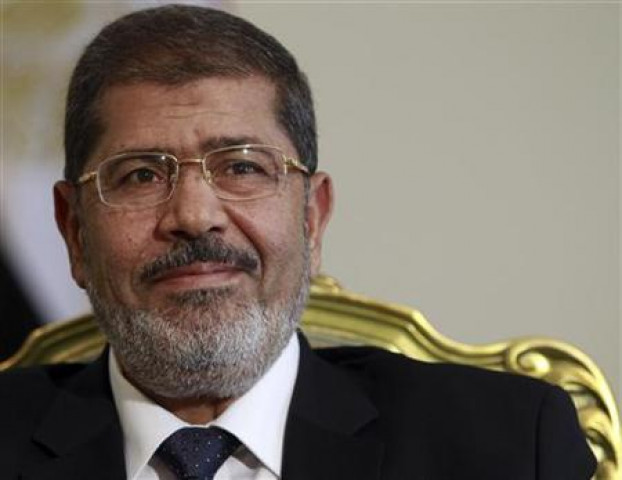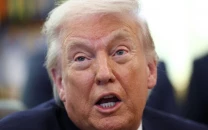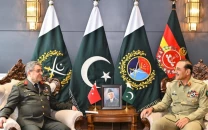World urges return to democracy in Egypt
"We believe that ultimately the future of Egypt can only be determined by the Egyptian people," says Obama.

Mohamed Morsi. PHOTO: REUTERS/FILE
The West walked a tightrope between concern at the situation and the need to acknowledge the popular anger that led to huge protests against Morsi, while Syria and some other Arab nations rejoiced at his ouster.
US President Barack Obama and many leaders shied away from calling the events a coup while urging a quick return to elected civilian government in Egypt, a pivotal US ally which receives $1.3 billion in annual American military aid.
"We believe that ultimately the future of Egypt can only be determined by the Egyptian people," Obama said in a statement after emergency talks with top aides. "Nevertheless, we are deeply concerned by the decision of the Egyptian armed forces to remove president Morsi and suspend the Egyptian constitution."
UN chief Ban Ki-moon urged a return to civilian rule in Egypt, saying it "should be resumed as soon as possible". Europe was divided on how to react to the departure of a second Egyptian president in the space of two years and yet another crisis on the other side of the Mediterranean. Britain, the former colonial power in Egypt, said that it was ready to work with the country's interim rulers despite disapproving of any military role in the democratic process.
"We will always be clear that we don't support military intervention but we will work with people in authority in Egypt. That is the practical reality of foreign policy," foreign minister William Hague said. Hague said he had spoken to his Egyptian counterpart on Thursday, who had promised that there would be early presidential elections.
But Germany took a far stronger line with Foreign Minister Guido Westerwelle describing Morsi's ouster as a "major setback for democracy in Egypt" and calling for dialogue and compromise.
The European Union gave a more tepid response. EU foreign policy chief Catherine Ashton said she was "fully aware of the deep divisions in society" in Egypt, adding that "I urge all sides to rapidly return to the democratic process", but making no condemnation of the army.
Russia called on all Egyptian political forces to "exercise restraint" but again offered no condemnation. Russia has long had friendly ties with Egypt and was guarded after the 2011 ouster of former president Hosni Mubarak.
China, traditionally wary of intervention in the internal affairs of other nations, said it supported the "choice of the Egyptian people" and called for dialogue but did not elaborate.
The Egyptian army toppled Morsi on Wednesday after a week of bloodshed that killed nearly 50 people as millions took to the streets, demanding he step down after a turbulent year of rule.
Top judge Adly Mansour was sworn in on Thursday as temporary president and Egypt's army has confirmed it is holding Morsi and several of his top aides.
Turkey, where Prime Minister Recep Tayyip Erdogan and his party faced down mass protests last month, said the events in Egypt were undemocratic.
"The power change in Egypt was not a result of the will of the people. The change was not in compliance with democracy and law," Deputy Prime Minister Bekir Bozdag said.
But Syria's embattled government reveled in the downfall of Morsi, hailing it as a "great achievement." President Bashar Al-Assad has been fighting a three-year battle against rebels that Damascus is keen to portray as dominated by radical extremists.
Saudi King Abdullah also praised the army's intervention, as did the oil-rich United Arab Emirates, whose own Muslim Brotherhood movement is the target of a crackdown in the oil-rich Gulf state.
Israel maintained silence on the events in Egypt, with which it signed a peace treaty in 1979.
Both Amnesty International and Human Rights Watch called for Egypt's new rulers to respect rights.



















COMMENTS
Comments are moderated and generally will be posted if they are on-topic and not abusive.
For more information, please see our Comments FAQ